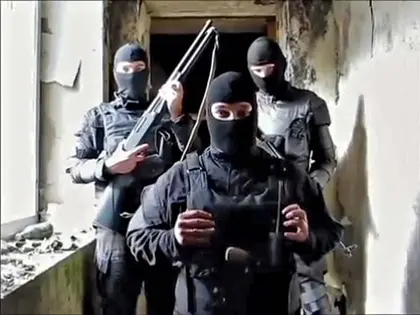One of them popped up in a YouTube video on May 2.
Although the group was unidentified, the clip was posted by a pro-Ukrainian group of former military and law enforcement officers, calling themselves the Donbass Volunteer Battalion. The video shows men armed with Kalashnikov rifles and clad in black ninja outfits dismantling a Kremlin-backed roadblock near Krasnoarmiysk in western Donetsk Oblast.
JOIN US ON TELEGRAM
Follow our coverage of the war on the @Kyivpost_official.
The national warriors also claim that 15 pro-Russian rebels were handed over to the police and that three Kalashnikovs were recovered.
The group’s leader, Semyon Semenchenko, wrote on his Facebook page that the group is “taking up arms and structuring like the Ukrainian Insurgent Army,” the World War II era partisan group that fought both Nazi Germany and Soviet NKVD units in a futile attempt to gain national independence for Ukraine.
Amid an increasingly chaotic atmosphere in eastern Ukraine where law enforcement has disintegrated, Semenchenko said that 25 battalions are being formed calling on volunteers to “organize, choose commanders, and contact us.”
Not waiting for the government to step in to quell what is unraveling into a Russian stealth invasion of eastern Ukraine, there is mounting evidence of similar groups being formed in Chernihiv, Kharkiv, in Kyiv and other regions.
“It seems like more and more Ukrainians are getting ready to defend their land themselves with a clear understanding that they cannot rely on the government,” said Oleksiy Melnyk, director of foreign relations and international security programs at the Razumkov Center. “I spoke recently with one of those activists (in Chernihiv)…When he had described their plans, I was impressed by the level of proficiency in all aspects and details.”
The think tank analyst noted how some former EuroMaidan activists in Kyiv are organizing in clandestine groups of up to five in which only the cell commander knows everyone “so in case there is betrayal in one cell, it won’t affect the whole network.”
Andriy Tarasenko, a high-ranking member of nationalist group Pravy Sektor (Right Sector), told the Kyiv Post that its military wing is cooperating with authorities on forming partisan units. Without giving numbers, he said the group already operates underground in Crimea, “is in half-clandestine mode in Luhansk and Donetsk,” while vowing to engage in partisan warfare “if it comes to it.”
Ukrainian special forces are also working to form partisan groups, according to Mykola Malomuzh who was chief of foreign intelligence at the Security Service of Ukraine in 2005-2010 and now is a government adviser.
“But it is too soon to activate them because that will signal that we’re giving up territory, and it’s not clear how much local support they’ll get (if they’re not homegrown in the region where they operate,)” said the former spy.
Their combined numbers are unknown, and experts wouldn’t venture an estimate.
Besides military combat and clandestine activity training, partisans need access to weapons. But it has to be done right, said military expert Dmitry Tymchuk, because firearms must be put into the right hands of commanders loyal to Kyiv.
Melnyk of the Razumkov Center added that “it is equally dangerous for the state to either provide or not provide self-defense groups with weapons, especially when they are not effectively controlled by military command.”
More importantly, perhaps, is support from the local population – a vital criterion for any successful partisan movement. Melnyk noted that although polls show overwhelming support in southeastern Ukraine for a united Ukraine, “the problem is that pro-Ukrainian citizens are less aggressive and less active…the (silent) majority is frightened, they are not soldiers.”
Still, it appears that related formations are still in the early planning or organizational stage. Tymchuk, a former lieutenant colonel who served in Iraq, Lebanon and Kosovo, said his network of analysts “hasn’t seen evidence of pro-Ukrainian partisan activity.”
More formal pro-Ukrainian defense groups successfully operate in parts of Kherson and Dnipropetrovsk Oblast where Governor Ihor Kolomoisky has played a major role in fortifying the region. The deputy head of Dnipropetrovsk Oblast National Defense headquarters, Kateryna Chizhyk, told the Kyiv Post that some 8,500 citizens assist with law enforcement in the region by coordinating with the defense and interior ministry.
They have been so successful that various groups from Kherson, Kharkiv, Luhansk, Zaporizhya and Odesa have either undergone training or begun consulting with Chizhyk to form analogous “territorial defense” groups.
A Defense Ministry-backed defense battalion is starting to form in Odesa as well, following the death of 46 people there on May 2 between pro-Ukrainian activists and Moscow-backed rebels.
Their effectiveness will be limited, however, if they don’t coordinate with law enforcement bodies that have displayed a reluctance to do their jobs in Odesa, Luhansk and Donetsk oblasts, said Anatoliy Boyko, head of the Odesa branch of the Committee of Voters of Ukraine.
Time also might be running out to prepare for partisan warfare, according to Melnyk.
Should the unrest escalate or Russian invade with conventional military forces, “they will face a very strong and massive rebellion,” but only if people are armed. “On the other hand, if there is an invasion then it can be too late to do that.”
Kyiv Post editor Mark Rachkevych can be reached at rachkevych@kyivpost.com.
You can also highlight the text and press Ctrl + Enter



